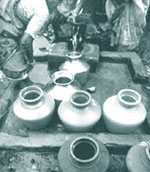Fundamental judgement
 clean drinking water is a fundamental right of all citizens, ruled the Supreme Court recently. The apex court said that Article 21 of the Constitution guaranteeing right to life also includes the right to clean drinking water and the state is duty-bound to provide it. The apex court has asked the Union ministry of law to review the existing environment laws so that environment courts could be set up for its enforcement. More importantly, the apex court has directed the law commission to explore the legal possibility of involving environmental scientists and experts in the green courts. The law commission is the nodal body of the government, that has the authority to review all existing laws.
clean drinking water is a fundamental right of all citizens, ruled the Supreme Court recently. The apex court said that Article 21 of the Constitution guaranteeing right to life also includes the right to clean drinking water and the state is duty-bound to provide it. The apex court has asked the Union ministry of law to review the existing environment laws so that environment courts could be set up for its enforcement. More importantly, the apex court has directed the law commission to explore the legal possibility of involving environmental scientists and experts in the green courts. The law commission is the nodal body of the government, that has the authority to review all existing laws.
"The verdict carries forward the court's constant emphasis on the right to clean environment,' says P P Rao, a constitutional lawyer and the former president of the Supreme Court's Bar Association. Quoting the 1977 resolution of the United Nations Water Conference that pledges access to clean drinking water for everybody, to which India is a signatory, the apex court said that today environmental rights are described as "third generation' rights, the first and second generation rights being political and socio-economic rights respectively.
The verdict was given by a division bench of the Supreme Court that set aside an earlier order of the Andhra Pradesh high court. The high court had allowed a polluting industrial unit to operate near Hyderabad city's Osman Sagar and Himayat Sagar, two water reservoirs that are the source of drinking water to some eight million people of the city. The industrial unit, Surana Oils and Derivatives (India) Limited, was situated within 10 km of the reservoirs, contrary to a Union government order that prohibited operation of any industrial unit within the area. Despite this prohibitory order and non-granting of consent by the state pollution control board, the state government allowed the industrial unit to operate in the area. The state government granted a special exemption to the unit simply on the basis of an assurance by the unit that it would dispose off its effluents in a safe manner. "Grant of such exemption was without statutory backing and also wholly arbitrary and violative of Article 21 of the Constitution. Exercise of such a power in favour of a particular industrial unit must be treated as arbitrary and contrary to public interest and in violation of the right to clean water under Article 21 of the Constitution,' the apex court ruled. Applying the
Related Content
- Judgement of the Supreme Court of India regarding schemes to alleviate the sufferings of the migrant labourers/workers, 29/06/2021
- Judgement of the Supreme Court of India regarding the validity of Aadhaar Act 2016, 26/09/2018
- Judgement of the Supreme Court of India regarding euthanasia, March 09, 2018
- Judgement of the Supreme Court of India regarding allocation and sharing of water of river Cauvery, 16/02/2018
- Judgement of the Supreme Court of India regarding privacy as a constitutionally protected value, 24/08/2017
- Judgement of the National Green Tribunal regarding pollution caused by a rubber factory, Ernakulam District, Kerala, 05/01/2016
